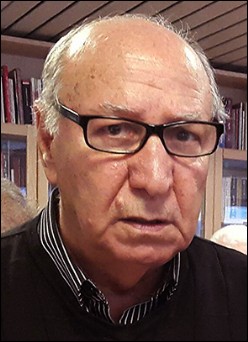First joint Forum UoS-SPU Universities Saulaimani
Main menu
Omar A. Sheikhmous MA

© Private picture
Born 1942 in Amouda, Syria. 1967 B.A. International Affairs, University of London. 1972 M.Sc. International Relations, University of Stockholm. 1978 Ph.D. Thesis prepared on Middle East conflict behaviour but abandoned for joining the PUK leadership in resistance against the then Saddam Hussein’s regime. Veteran international Kurdish scientist, writer, translator, advisor & human rights campaigner. Noumerous studies, books & articles about Kurdish history, literature, culture, & civilization.
Summary Omar Sheikhmous: Future options of the Kurds in Syria -
Future options for the Kurds in Syria -
Option one:
Maintain the current status quo, despite loss of Afrin in order to keep control of Kobani and Aljazeera and stave off Turkish threats of invading those areas that are rich in oil, natural gas, agricultural products and water resources. Especially, if Raqqa and Deir Al-
Option two:
Due to uncertainty whether US and Allied forces will remain in the region or not and for how long: Continue negotiating with the Assad regime to reach an agreement on political decentralization and recognition of Kurdish cultural and linguistic rights. Accept integration of its armed forces with the Syrian and disband its security force “Asayish”.
Option three:
Play for time and wait for the outcome of the battle for Idlib. Then start negotiating with a weakened Assad regime to get more concessions and recognition of their rights to autonomy and federation.
Option four:
Putting the Kurdish House in order in Syria, i.e. improve relations with the Kurdish National Council and other main Kurdish political parties in forming a common administration and elected legislative, similar to the process of 1992 in Iraqi Kurdistan. This would strengthen the position of the Kurds vis-
Option five:
Hope and work for resumption of peace talks between PKK and the Turkish Government that reflect on their relations with Turkey and distance the threat of Turkish invasion against other areas of Syrian Kurdistan. This would involve a more neutral and a more diplomatic rhetoric towards Turkey.
Option six:
Throw its weight behind US strategy in staying in Syria and checking Iranian presence and influence in the country, and await a bilateral Russian -
Option seven:
The suicide option: Continuing the current stubborn and irreconcilable policy of monopolizing power by PYD and its affiliates, in a very undemocratic manner and insisting on being hostile to all political and military forces in the region and attempt to implement their undeveloped ideological model by force, despite all consequences, e.g. near total destruction of Kobani and loss of Afrin.
Option eight:
The wisdom and maturity option: Becoming more realistic and lower their ambitions by starting a process of openness, reconciliation and dialogue with all ethnic, religious and societal groups, especially non-